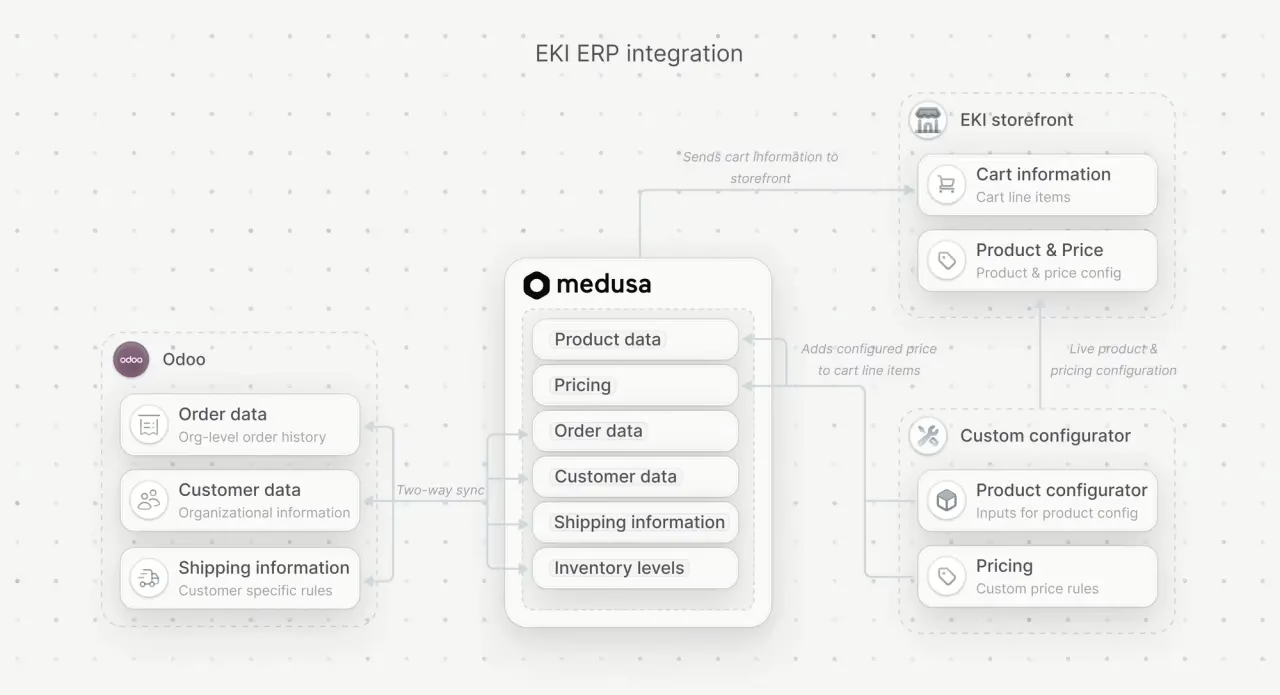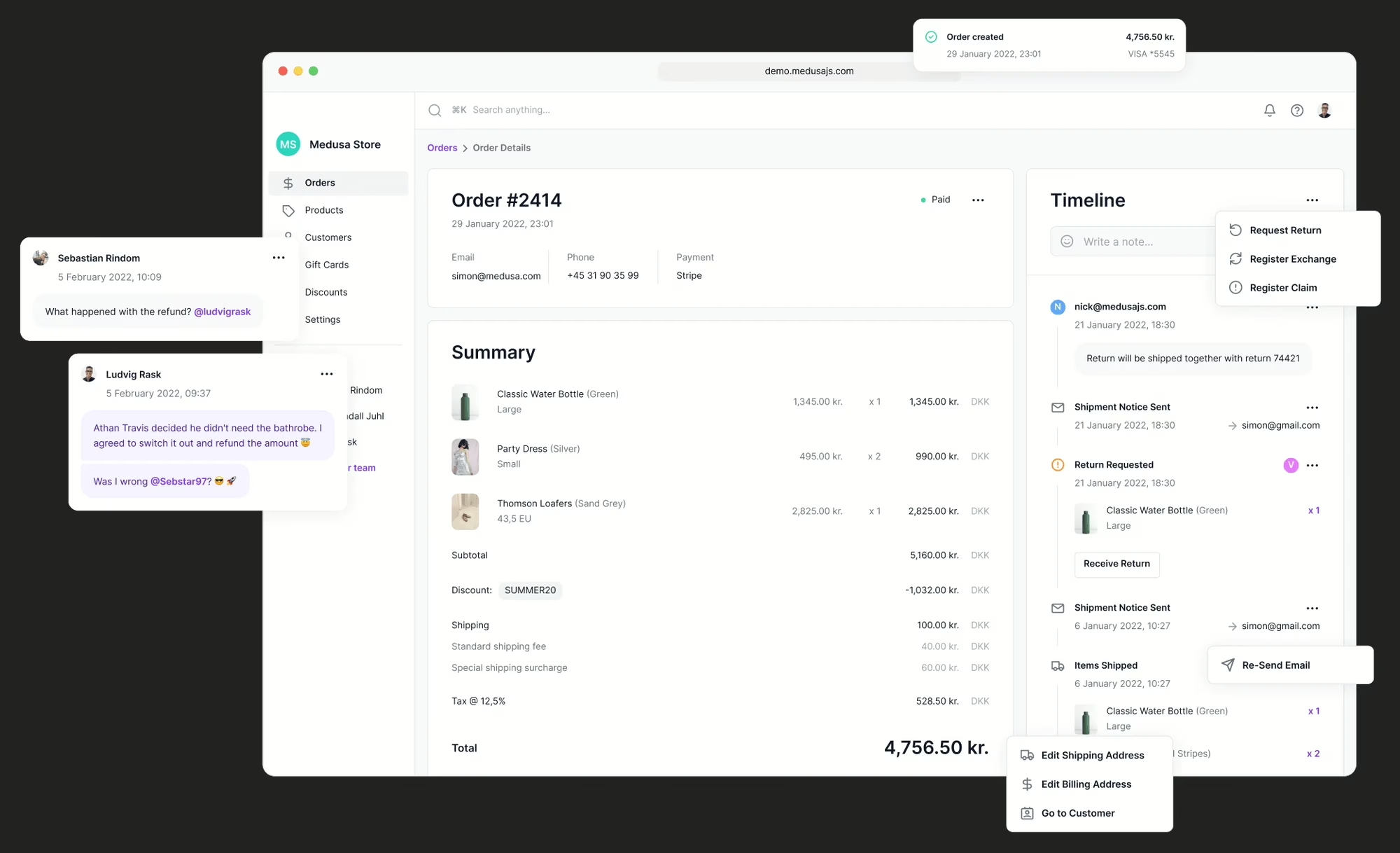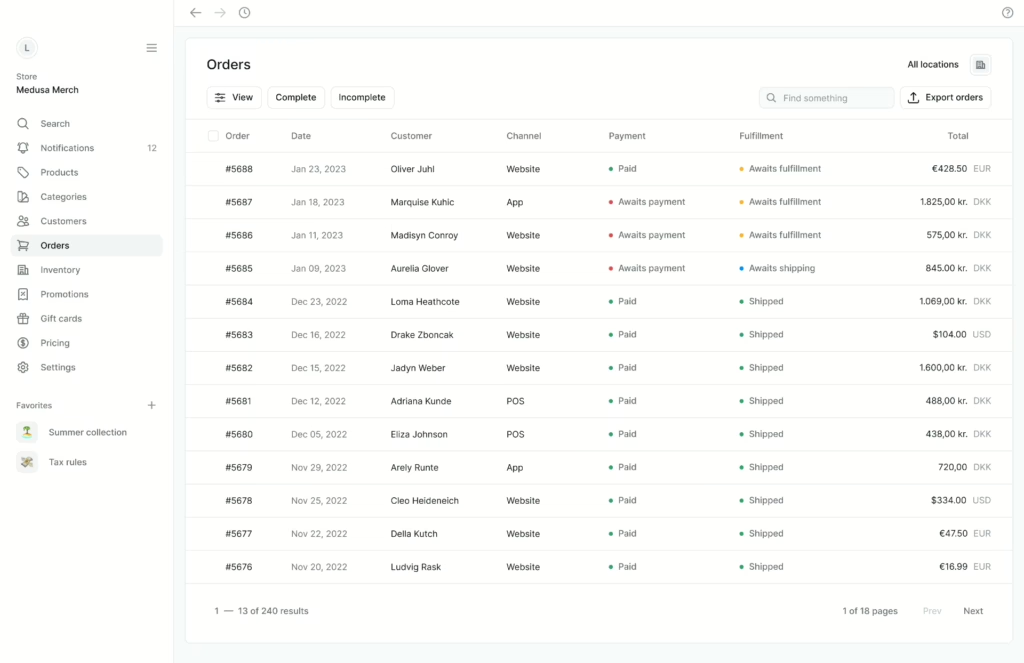In the fast-changing e-commerce landscape, picking the right platform is key to success. Well-known options like Shopify and Magento have been popular for a while because they work well. But now, Medusa JS is offering a fresh approach that gives business leaders more flexibility, saves money, and offers better control.
Medusa JS, an open-source platform, provides a unique advantage in the competitive landscape. It offers business leaders the ability to customize their e-commerce solutions to better fit their specific needs, a stark contrast to the limitations imposed by conventional platforms. The focus on open-source technology not only presents cost-saving opportunities but also delivers scalability and better ownership, making it an attractive alternative for forward-thinking enterprises.
This article delves into the features that set Medusa JS apart from traditional platforms, exploring its versatility in handling e-commerce challenges and identifying its practical applications in diverse marketplaces. By examining its integration processes and comparing it against established platforms, business leaders will gain valuable insights into whether Medusa JS aligns with their business goals and how it might redefine their strategy in the competitive e-commerce sphere.
Key Features of Medusa JS
Medusa JS is an innovative open-source e-commerce platform designed to provide businesses with the flexibility and freedom to build highly customizable online stores. Its headless architecture lets businesses separate backend operations from the frontend design, giving them greater control over user interfaces. This setup facilitates seamless, tailored online shopping experiences, which is a significant advantage over traditional e-commerce platforms. Medusa JS efficiently handles essential e-commerce operations, such as product management, order processing, payment handling, and shipping organization. Moreover, the platform’s ability to integrate with various payment providers further enhances its adaptability to diverse business requirements.
Open-source Advantage
The open-source nature of Medusa JS offers businesses significant advantages over traditional e-commerce platforms. By allowing seamless integrations with critical commerce functions like finance and stock management, Medusa JS facilitates a more cohesive and scalable solution. This platform is specifically designed to maintain core functionalities while supporting comprehensive customization, ensuring robust performance and flexibility. Open-source frameworks, such as Medusa JS, empower businesses to scale optimally and manage long-term costs effectively, offering high customization options without compromising essential features—a critical consideration for businesses aiming to enhance their e-commerce experience cost-effectively.
Cost-saving Opportunities
Medusa JS provides avenues for significant cost savings by eliminating typical charges associated with traditional platforms like Shopify, such as monthly fees and transaction costs. The open-source nature of Medusa JS allows businesses free access to the platform, reducing long-term operational expenses. By avoiding proprietary vendor lock-in, businesses save on costs related to switching or integrating new systems. Additionally, the scalability feature of Medusa JS ensures that businesses do not face increased costs as they expand, ensuring an efficient growth trajectory. With its ease of integration with various tools, Medusa JS helps businesses save on potentially costly custom integrations, presenting a cost-effective alternative to traditional e-commerce systems.
Scalability Benefits
Medusa JS provides scalable solutions tailored to meet the dynamic needs of growing e-commerce businesses. Its flexibility allows businesses to adapt their store setups to specific requirements without facing inflated costs, making it an ideal choice for scalability. As a headless system, Medusa JS separates backend operations from the user-facing frontend, facilitating adaptability and customization essential for evolving business needs. Migrating from platforms like WooCommerce to Medusa JS can provide enhanced performance and stability, supporting higher traffic volumes and robust scalability. The composable architecture of Medusa JS allows for seamless integration across various sales channels, ensuring that scalability is maintained alongside quick development cycles.
Enhanced Ownership and Control
Medusa JS provides businesses with complete ownership of their e-commerce systems, ensuring full control over the platform. Unlike traditional systems with limitations, Medusa offers unlimited potential for custom features, granting businesses the ability to tailor functionalities as required without additional costs. By not being tied to a single provider, Medusa JS eliminates dependency risks associated with changes in provider pricing or policies. Businesses using Medusa JS can freely modify their system architecture, which is crucial for adapting to changing business requirements. This flexibility and control ensure that Medusa remains a highly attractive option for businesses seeking to enhance their e-commerce capabilities efficiently.
Comparing Medusa JS to Traditional Platforms
Medusa JS is emerging as a compelling alternative to traditional e-commerce platforms, offering a unique combination of flexibility, scalability, and cost efficiency. Unlike some popular options like Shopify or Magento, Medusa JS boasts an open-source, headless architecture that provides businesses with the freedom to design bespoke online shopping experiences without vendor-imposed restrictions. This flexibility empowers businesses to have full control over their e-commerce operations, crafting a digital storefront that aligns precisely with their brand and customer expectations. Moreover, Medusa JS’s modular architecture allows for easy scaling as businesses grow, enabling them to adapt their store infrastructure to meet evolving demands. This adaptability not only enhances the user experience but also optimizes operational efficiency. Additionally, businesses can benefit from the cost efficiencies of Medusa JS, potentially realizing savings that compete with or surpass those offered by traditional platforms. Its open-source nature indeed acts as a game-changer for those seeking customizable solutions without the burden of hefty subscription fees.
Integration Processes
The integration process is critical in determining how effectively an e-commerce platform can align with a business’s current setup, including existing tools and workflows. Platforms that provide limited integration options can lead to operational inefficiencies and necessitate additional development costs – a challenge that many traditional platforms pose. In contrast, Medusa JS prioritizes seamless integrations by supporting open APIs, which facilitate easy connectivity with tools such as ERP, CRM, marketing automation, and analytics systems. This robustness ensures that businesses can integrate their preferred systems, streamlining key operations like finance, stock management, and customer relations. Moreover, Medusa JS’s strong developer community serves as an invaluable resource, simplifying plugin development and ensuring that integrations are seamless and effective. The flexible frameworks it employs are crucial for maintaining smooth operations across various business functions, further cementing Medusa JS’s role as a cost-effective and adaptable platform.
Versatility for E-commerce Challenges
Medusa JS stands out for its ability to address numerous e-commerce challenges through its flexible platform, which supports extensive customization. This adaptability enables businesses to craft online stores that closely reflect their unique requirements, ensuring a seamless customer journey from start to finish. As an open-source solution, Medusa JS eliminates the need for costly monthly fees and transaction charges commonly associated with traditional platforms like Shopify. Its headless architecture distinguishes backend operations from front-end interactions, allowing businesses to create a unique customer-facing interface without sacrificing backend functionality. By supporting seamless integrations with various software such as payment processors and warehouse management systems, Medusa JS ensures that businesses can streamline their operations smoothly. scalability is a key advantage; Medusa JS can efficiently grow alongside enterprises, accommodating increasing demands without compromising performance.
Limitations of Traditional Platforms like Shopify
Traditional e-commerce platforms like Shopify Plus, while popular, often come with inherent limitations that can hinder a business’s capacity for customization and operational efficiency. One major issue is the vendor restrictions these platforms impose, significantly limiting a company’s ability to tailor its digital presence to specific needs and preferences. This often leads to increased dependency on costly plugins and extensions to achieve desired functionalities, which can inflate costs and complicate the system stack. Additionally, many businesses find Shopify Plus’s premium solutions excessively expensive and not well-suited to their actual requirements. Operational inefficiencies also arise due to logistic challenges, such as inaccurate stock synchronization, which can disrupt sales and customer satisfaction. The lack of flexibility inherent in these platforms makes cross-team integration challenging, impeding timely data flow and necessitating complicated workarounds. Thus, businesses can benefit significantly from Medusa JS’s more flexible and cost-effective integration capabilities.
Practical Applications of Medusa JS
Medusa JS stands out in the realm of e-commerce platforms by offering a highly customizable, open-source solution that empowers businesses to craft bespoke online stores. This flexibility distinguishes it from traditional platforms that often come with rigid structures and limited customization options. As a backend system, Medusa JS efficiently manages essential e-commerce functions such as product management, order processing, payment handling, and shipping organization. Its headless architecture allows businesses to decouple the backend from the frontend, giving them the freedom to employ preferred front-end technologies. This adaptability makes Medusa JS an attractive choice for enterprises looking to have greater control over their e-commerce experience and functionality.
Suited for Diverse Marketplaces
Medusa JS provides a tailored and flexible e-commerce solution especially beneficial for businesses aspiring to create unique online stores. As an open-source platform, it offers full control, free from vendor restrictions, and endless customization opportunities. This feature positions Medusa JS as superior in scalability and cost-efficiency compared to traditional platforms like Magento, Shopify, and Salesforce Commerce Cloud. It is crafted with technical users in mind, necessitating either in-house developers or agency partnerships for optimal setup and management. Medusa JS’s success is evident in its recognition as the #1 e-commerce product on ProductHunt and its status as the most starred engine on GitHub.
Assessing Medusa JS for Your Business
In the ever-evolving landscape of e-commerce, businesses are tasked with selecting platforms that not only fit their current needs but also offer the adaptability required for future growth. Medusa JS emerges as an open-source e-commerce platform providing businesses with unrivaled flexibility. It enables the creation of online stores tailored to specific needs without being restricted by fixed templates. As a headless e-commerce platform, it separates backend functionalities from the front-end design, allowing businesses to customize the shopping experience uniquely. This separation is particularly beneficial for companies aiming to differentiate their customer experience from competitors, like those using Salesforce Commerce Cloud or Adobe Commerce Cloud. By supporting seamless integrations with various financial, stock management, and operational systems, Medusa JS offers a comprehensive, scalable infrastructure. It aids businesses in evolving without the traditional platform constraints on pricing models, thereby aligning seamlessly with both current and future operational requirements.
Suitability for Business Needs
Medusa JS is strategically designed to cater to businesses seeking more control over their e-commerce setup compared to traditional platforms such as Shopify or Magento. It allows significant customization, enabling e-commerce stores to meet precise operational requirements. The platform excels in handling core e-commerce functions like product management, order processing, payment handling, and shipping organization. This level of control ensures businesses can create a personalized commerce experience. Furthermore, with its ability to support high traffic, large product inventories, and integration with additional tools and services, Medusa JS addresses future scalability concerns effectively. This capability is vital for businesses looking to avoid Pay-as-you-grow pricing models inherent in many traditional platforms, making it a potentially cost-effective solution for scalable operations.
Strengths of Medusa JS
Medusa JS stands out in the e-commerce platform landscape primarily due to its high level of customizability and flexibility for online stores. It adopts a headless system approach, allowing businesses to create a tailored shopping experience independent of backend processes. Unlike traditional e-commerce platforms, Medusa JS empowers businesses by liberating them from pre-set templates or structures, allowing the development of a distinct online presence. Moreover, the platform supports integration with various payment providers, enhancing adaptability to diverse business needs. As a robust backend system, it efficiently manages crucial e-commerce functions such as product management, order processing, payment handling, and shipping organization. This makes it a reliable option for businesses prioritizing adaptability and control in their e-commerce operations.

Potential Drawbacks to Consider
While Medusa JS offers a plethora of benefits, there are potential drawbacks that businesses should consider. A limited integration option can lead to inefficiencies and increased development costs. It’s crucial for an e-commerce platform to enable seamless integration capabilities to prevent disruption in existing workflows and tools. Platforms lacking open APIs might complicate integrating preferred systems like ERP, CRM, and analytics, which are often integral to a business’s current setup. Additionally, without scalable solutions, platforms may struggle to accommodate increasing operational demands, potentially hindering growth. Moreover, restricted customization might lead to higher costs as businesses attempt to meet their precise needs through additional modifications. Therefore, while considering Medusa JS, businesses should carefully weigh these potential challenges against their operational strategies and objectives.
How Novemind Can Help You Build Scalable Medusa JS Stores
At Novemind, we specialize in creating scalable, custom e-commerce solutions using Medusa JS. Our team leverages its open-source flexibility and headless architecture to build stores that grow with your business, offering full control, seamless integrations, and cost-effective scalability. Whether you’re transitioning from traditional platforms or starting fresh, we’ll help you unlock the full potential of Medusa JS.





